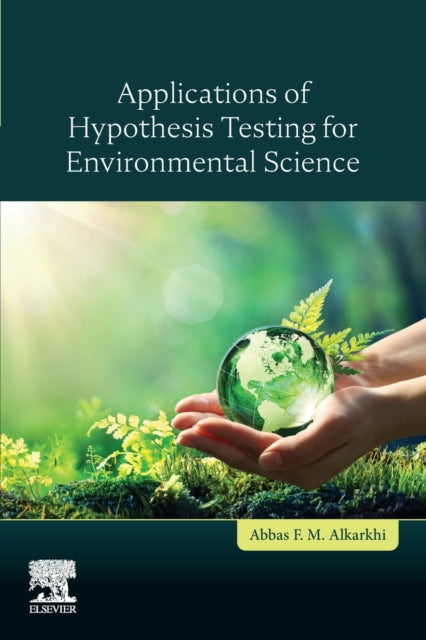Abbas F.M., Malaysia) Alkarkhi
Applications of Hypothesis Testing for Environmental Science
Applications of Hypothesis Testing for Environmental Science
YOU SAVE £6.25
- Condition: Brand new
- UK Delivery times: Usually arrives within 2 - 3 working days
- UK Shipping: Fee starts at £2.39. Subject to product weight & dimension
Bulk ordering. Want 15 or more copies? Get a personalised quote and bigger discounts. Learn more about bulk orders.
Couldn't load pickup availability
- More about Applications of Hypothesis Testing for Environmental Science
Applications of Hypothesis Testing for Environmental Science is a book that explains the theory and application of hypothesis testing in environmental science. It provides step-by-step guidance for analyzing and testing environmental data, with examples and case studies to demonstrate the practical applications of the methods. The book is useful for researchers, postgraduates, graduates, and academics in environmental sciences, as well as those in related fields who need to analyze data or perform hypothesis tests.
Format: Paperback / softback
Length: 292 pages
Publication date: 04 December 2020
Publisher: Elsevier Science Publishing Co Inc
Applications of Hypothesis Testing for Environmental Science is a comprehensive guide that delves into the theory and practical applications of hypothesis testing in the field of environmental science. This invaluable resource empowers researchers to conduct appropriate tests for decision-making on a wide range of environmental issues. Serving as a step-by-step guide, the book offers a thorough understanding of the concepts and methodologies of hypothesis testing, making it accessible to scholars, postgraduates, and graduates in environmental sciences, as well as academics seeking a book that includes case studies of the applications of hypothesis testing. Additionally, this book proves to be a valuable resource for researchers in related fields and those who may need to analyze data or perform hypothesis tests in their research, even if they are not familiar with statistical methodologies.
Hypothesis testing plays a crucial role in environmental science as it enables researchers to evaluate the strength and validity of their hypotheses. By conducting rigorous tests, researchers can gather evidence to support or refute their assumptions, leading to more informed decision-making and better conservation strategies.
One of the key applications of hypothesis testing in environmental science is in the field of ecological research. Ecologists use hypothesis testing to test whether a particular variable, such as the presence of a species or the impact of a certain environmental factor, affects the outcome of a study. For example, a researcher may hypothesize that the introduction of a certain species of bird will increase the population of a particular plant species. By conducting a controlled experiment or observational study, the researcher can test this hypothesis by comparing the populations of the plant species before and after the introduction of the bird.
Hypothesis testing is also used in environmental impact assessment to evaluate the potential effects of proposed projects or policies on the environment. For example, a government agency may propose a new road construction project that is expected to have significant environmental impacts. By conducting a hypothesis test, the agency can evaluate whether the proposed project is likely to have the desired effects or whether it is likely to have negative impacts on the environment.
In addition to ecological research and impact assessment, hypothesis testing is also used in environmental monitoring and management. For example, a water management agency may monitor water quality in a particular river basin to determine whether there are any changes in water quality that may be caused by human activities or natural factors. By conducting hypothesis tests, the agency can identify any significant changes in water quality and take appropriate action to address the issue.
Hypothesis testing is a powerful tool that enables environmental scientists to gather evidence-based conclusions and make informed decisions. By conducting rigorous tests and evaluating the strength and validity of their hypotheses, researchers can contribute to the better understanding and management of our natural environment.
In conclusion, Applications of Hypothesis Testing for Environmental Science is a comprehensive guide that provides a thorough understanding of the theory and practical applications of hypothesis testing in environmental science. By empowering researchers to conduct appropriate tests for decision-making on a wide range of environmental issues, this book contributes to the better understanding and management of our natural environment. Whether you are a scholar, postgraduates, graduate, or academic seeking a book that includes case studies of the applications of hypothesis testing, this resource is invaluable.
Weight: 478g
Dimension: 153 x 228 x 19 (mm)
ISBN-13: 9780128243015
This item can be found in:
UK and International shipping information
UK and International shipping information
UK Delivery and returns information:
- Delivery within 2 - 3 days when ordering in the UK.
- Shipping fee for UK customers from £2.39. Fully tracked shipping service available.
- Returns policy: Return within 30 days of receipt for full refund.
International deliveries:
Shulph Ink now ships to Australia, Belgium, Canada, France, Germany, Ireland, Italy, India, Luxembourg Saudi Arabia, Singapore, Spain, Netherlands, New Zealand, United Arab Emirates, United States of America.
- Delivery times: within 5 - 10 days for international orders.
- Shipping fee: charges vary for overseas orders. Only tracked services are available for most international orders. Some countries have untracked shipping options.
- Customs charges: If ordering to addresses outside the United Kingdom, you may or may not incur additional customs and duties fees during local delivery.


